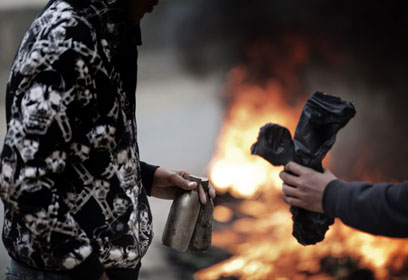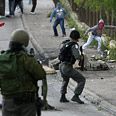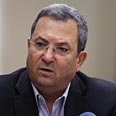A statement issued by the organization, whose vast majority has disarmed, noted "We intend on preventing any attempts to judaize Jerusalem" and "the ongoing violation of the al-Aqsa Mosque opened the gates to a campaign against the enemy without limitations."
In the backdrop of Jerusalem unrest Hamas' military wing, Izz al-Din al-Qassam Brigades announced they are "considering a response which will lead to victory."
The wing's spokesman, Abu Ubaida, called on the Palestinian Authority to stop persecuting his group's members and stated that the riots in Jerusalem "will lead to a renewed explosion, which will prove that Jerusalem will continue to serve as the engine which ignites revolutions and intifadas until the liberation of all Palestinian land."
He further noted that Hamas will react in a way which will hurt the enemy. "The 'hurva' will become the demise of the Zionist entity."

Morning of clashes in Jerusalem (Photo: AFP)
According to Palestinian reports, more than 100 people were injured in Tuesday's clashes and almost 70 were arrested. Riots have continued in recent hours in several areas in the capital. Palestinians hurled stones at police and Border Guard forces in the neighborhood of Issawiya, as well as in the Shufat refugee camp and in the Atarot Checkpoint.
Similar incidents were also recorded in Ras el-Amud, where a man suspected of hurling stones at security forces was arrested, and in Jabel Mukaber where five people were detained. Clashes were also noted in the village of Naalin west of Ramallah, where four people were injured. Overall, 14 police officers were wounded during the day.
In the Hebrew University's Mount Scopus campus police detained three left-wing activists suspected of incitement, after a scuffle broke out between them and right-wing protestors.
'Riots boost radicalism'
Defense Minister Ehud Barak tried to calm matters from Madrid, where he is holding a visit. He addressed the riots during a meeting with his Spanish counterpart Carme Chacon. "Disturbances in east Jerusalem and Palestinian riots will only cause the strengthening of extreme elements on both sides.
"Israel will not allow radicals to dictate and coerce political agreements. Israel is strong and must reach political settlements. The lack of political negotiations will spur on extremists on both ends, and today's riots prove that. A political settlement could only be reached in direct negotiations."
Barak also referred to the current crisis with the US. "We are the only ones responsible for Israel's security, however the bond with the American people and the relations of trust with the president and the administration are a central facet of Israel's security and its foreign relations.
"The United States' friendship, the intimate bond and tight security relations between the two countries are important both for Israel's security and the need for calm in the region as well as the resumption of the political process with the Palestinians and our neighbors."
At the end of the meeting, Barak and Chacon signed a strategic security cooperation agreement between Israel and Spain.
Shmulik Grossman and Roni Sofer contributed to this report

















